Madeleine Albright, in her words: How she became secretary of state and the importance of calling out wrongs
- Oops!Something went wrong.Please try again later.
- Oops!Something went wrong.Please try again later.
- Oops!Something went wrong.Please try again later.
Madeleine Albright, who passed away Wednesday at 84, spoke in 2020 with USA TODAY Editor-in-Chief Nicole Carroll about her history-making career, the importance of speaking up as a woman (and for women) and finding her voice.
Madeleine Albright is one of USA TODAY's Women of the Century. To commemorate the 100th anniversary of the 19th Amendment, we've assembled a list of 100 women who've made a substantial impact on our country or our lives over the past 100 years. Read about them all at usatoday.com/womenofthecentury
Madeleine Albright calls the period before she was named secretary of state "the great mentioning."
"It was clear that Warren Christopher was not going to be secretary for a second term (under President Bill Clinton) and I was at that point ambassador to the United Nations with a Cabinet-level position," she recalled.
"So, my name was mentioned as a possible secretary of state. What happened was there was somebody who said, 'Well, a woman can't be secretary of state because Arab leaders will not deal with a woman.' "
But the Arab ambassadors of the U.N. disagreed.
"They got together and said, 'We've had no problems dealing with Ambassador Albright; we wouldn't have any problem dealing with Secretary Albright.' "
Then she said, "Somebody at the White House, and I never want to know who, said, 'Yes, Madeleine is on the list but she's second tier.' I only learned this later when I did become secretary."
USA TODAY’s Women of the Year: Diverse stories, similar threads woven through lives of the honorees
At the time, she was regularly traveling with the president and then-first lady Hillary Clinton.
"The shtick was I would introduce her and she would introduce him," Albright said. "So during this period of 'great mentioning,' Hillary would come to him and say, 'Why wouldn't you name Madeleine? She's most in tune with your views, expresses them better than anybody else, and besides it would make your mother happy.' "
Albright was sworn in as the nation's first female secretary of state on Jan. 23, 1997.
Of the things she's most proud of: Pushing the president to lead NATO in 1999 on a bombing campaign to halt ethnic cleansing in Kosovo.
She's also famously known for saying, "There is a special place in hell for women who don't help other women."
"It ended up on a Starbucks cup," she said.
Question: Can you talk about how you grew up?
Madeleine Albright: I was born in 1937 in Prague and in 1939 the Nazis invaded Czechoslovakia. My father was a Czechoslovak diplomat and so we managed to escape to England. I was in London all through the Blitz in a cellar of an apartment house that we lived in on Notting Hill Gate before it got fancy.
Then after the war, we went back to Czechoslovakia very briefly and then my father was made the Czechoslovakia ambassador to Yugoslavia. My father hadn't wanted me to go to school with communists. So, my parents decided to send me to Switzerland to school.
We came to the United States in 1948. I lived in many, many places. I was asked to describe myself in six words at dinner, which were "worried, optimist, problem solver, grateful American."
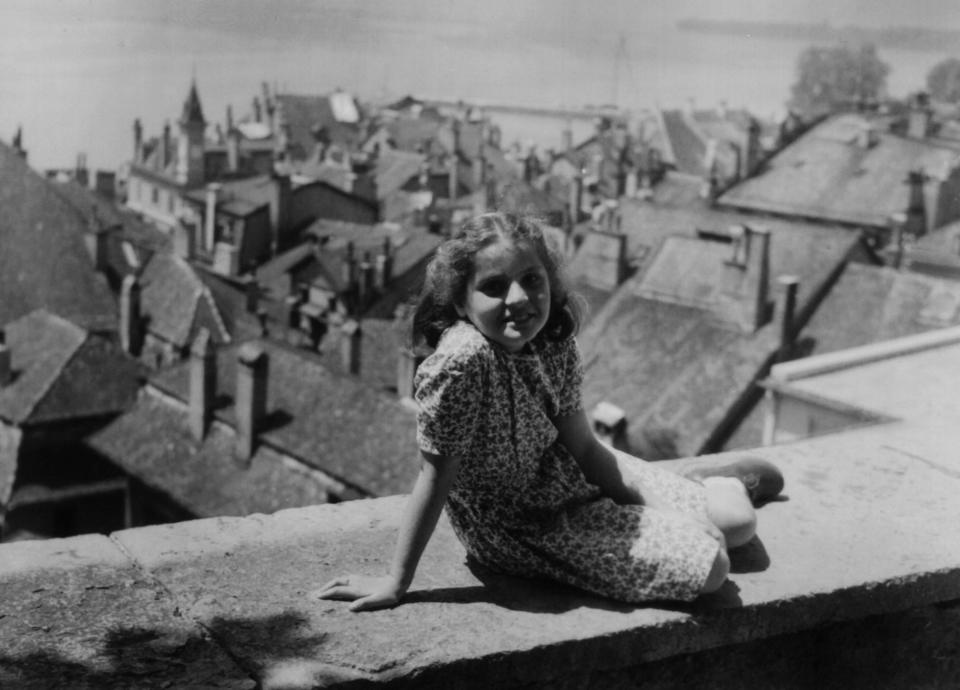

Who paved the way for you?
My parents clearly did. I did go to a women's college, Wellesley. I had a lot of inspirational women, professors and great classmates.
But really who paved the way were a lot of political men. One of my first jobs was working for Sen. Ed Muskie of Maine as his chief legislative assistant. Fortunately by then I had a Ph.D. so I wasn't just Madeleine, I was Dr. Albright. Then Zbigniew Brzezinski, who had been my professor at Columbia, asked me to work at the White House on the National Security Council staff.
Obviously the ultimate man that paved the way was Bill Clinton, with a lot of help from Hillary.
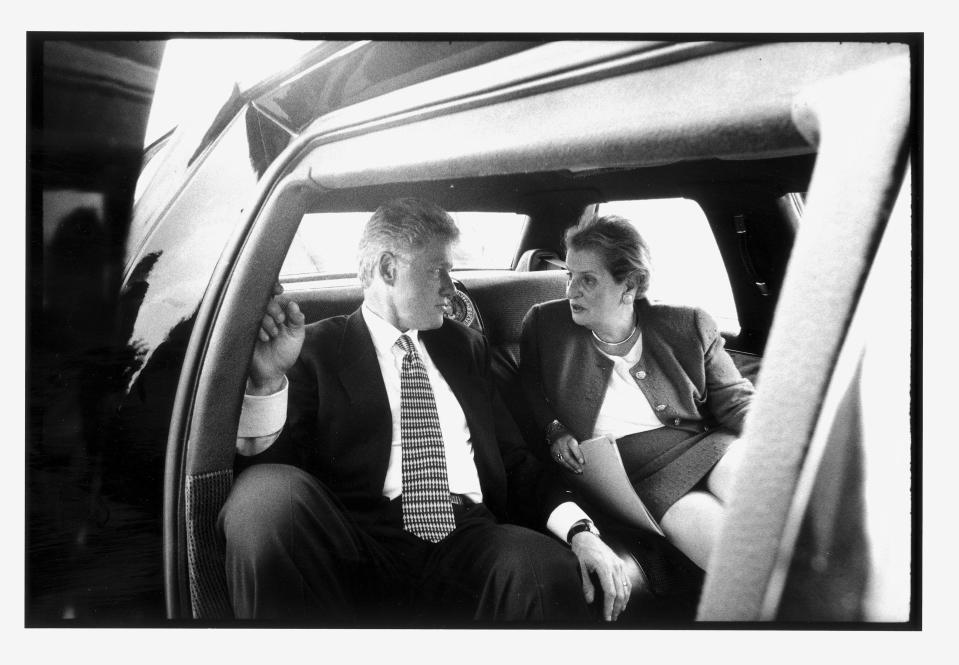

Do you think she pushed your name to the top?
Yes I do, actually. We'd gotten to know each other well. Hillary would come up and visit me quite frequently when I lived in New York.
Sometimes people ask me about my life-balance issues; the Beijing Women's Conference is the perfect example. I led the delegation and so Hillary wanted me to go with her, to arrive with her and I had to leave my youngest daughter's wedding reception in order to go. Then Hillary gave that incredible speech about human rights being women's rights and women's rights, human rights.
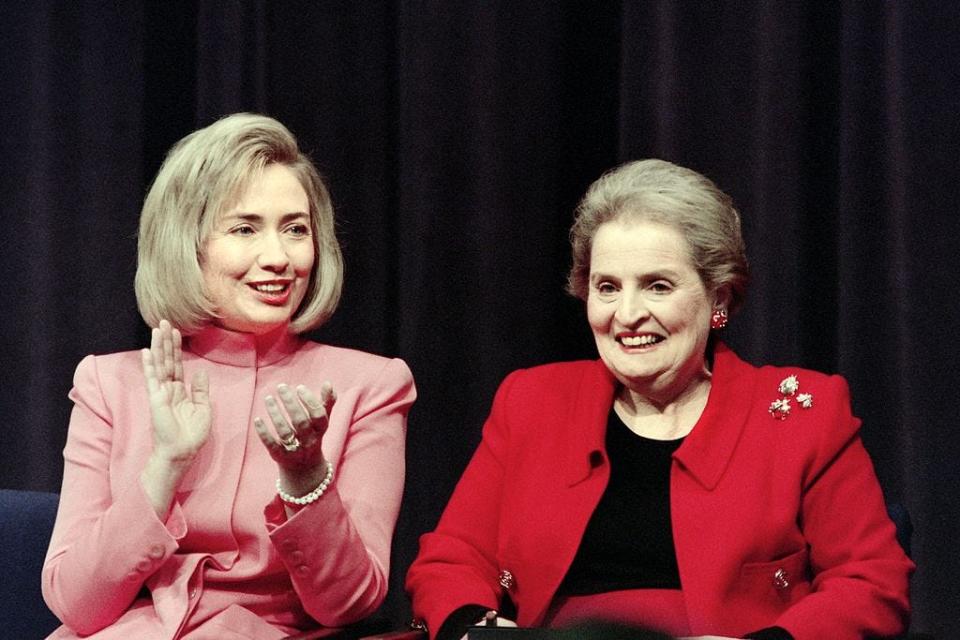

I would not ask you about balance because nobody asks that of men.
That's true, yeah.
But I am curious, do you feel like you've been held to a different standard because you're a woman?
I did have a solid foreign policy background. But I think there did continue to be questions about whether a woman could be secretary of state.
I didn't have any problems with foreign governments. I did arrive in a large plane that said United States of America and they knew that if they were going to do foreign policy they at least had to talk to me.
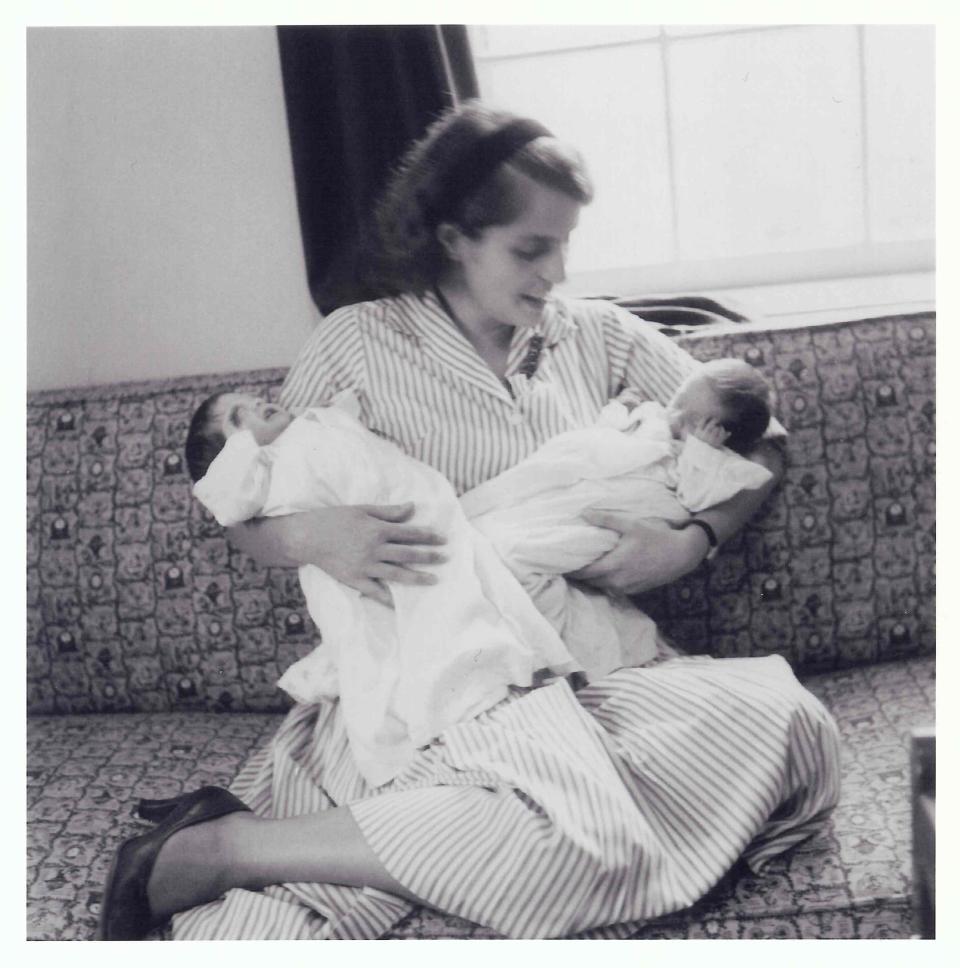
I had more problems with the men in our own government. Not because I think they were male chauvinist pigs or anything like that, I think that they had just known me too long. I had been in Washington a long time. I knew their wives well. I was a carpool mother. They would come to my house for dinner, which either I had cooked or helped to pass around the plates or clear.
I had then been a staffer on the Hill. I made a lot of coffee. I think some of them thought, "How did she get to be secretary of state when I should be secretary of state?" So, I did get a sense that I was being held to a different standard.
When I argued for something, a couple of them actually would say, "Don't be so emotional." Or people kind of tapping their fingers on the table if they thought I was speaking too long. So, yes, definitely. But I did have a lot of friends who gave me the time of day. And obviously none of it would have happened without President Clinton.
In the Oval Office, he would say, "I want to hear what Madeleine has to say." Or, "What does the secretary of state think?"

Here you are in the Oval Office and it still took a man to call on you to get your voice out there.
Yeah. I think this has happened to every single woman, if you're the only woman in the room and there is a discussion going on, you think to yourself, "I'll say something."
Then you think, "No, I won't say it because it will sound stupid." Then some man says it and everybody thinks it's brilliant and you're really mad at yourself for not having said something.
After I had done that during the prior administration, kind of sat in meetings, I go to teach at Georgetown and I decided that my motto was going to be, for everybody, that you have to interrupt. Partially what happens in big meetings, if you raise your hand, you don't get called on. But if you're going to interrupt you have to know what you're going to say. So, I start teaching and I said nobody can raise his or her hand, you have to interrupt.
I now interrupt a lot.
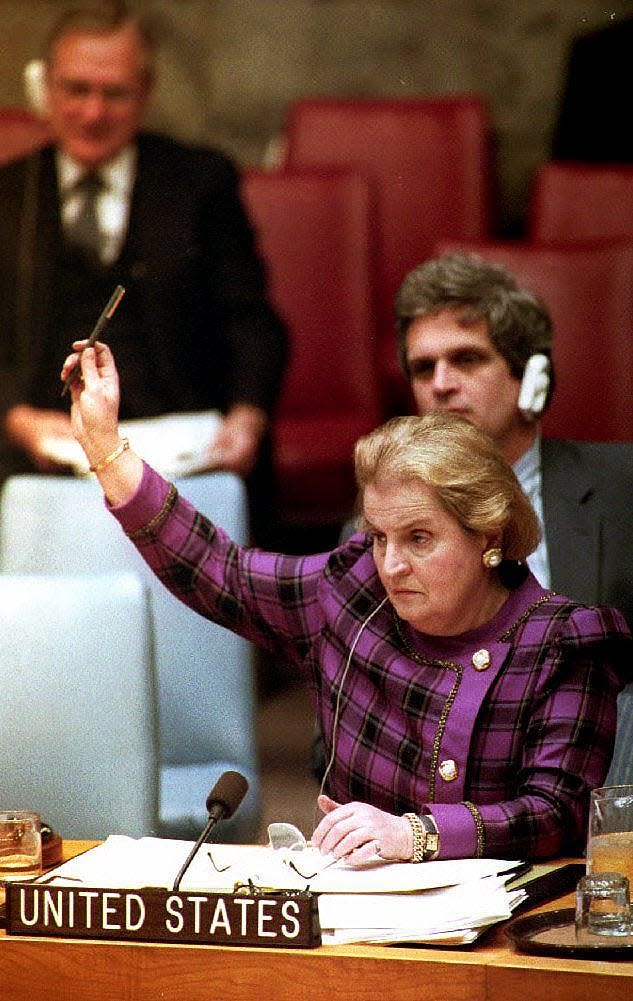

At the U.N., people would call you tough or cold or abrasive. Do you think that had to do with being a woman?
First of all, I'm not sure that people fully understand – male or female, when you go to a foreign country, you do begin with a bunch of small talk. If you are doing your job, you have prepared to say any number of things. You have talking points, which you have memorized.
So I had a trick, which was, after too much of the small talk, I would say, "I have come a long way so I must be frank." Then I really did make a point of what I needed to say.
It was usually something about human rights or some aspect of governance that wasn't working. I was fairly direct, I have to say, because I think that sometimes it's important in terms of the tone. I don't think frankly that I was rougher, tougher or anything than any man. I just think people were surprised to hear that language from a woman.

What are you most worried about? What keeps you up at night?
Well, I think the Chinese issue is a very complicated one. In every campaign there are some negative things about China. Then you kind of have to figure out how to walk it back, how to have relationships with China. But I don't think we've ever been in a situation that is quite as really brittle.
I am worried about Russia because, while the Chinese I think are operating from a position of more and more strength, the Russians are basically (Vladimir) Putin playing a weak hand very well. What he's doing is undermining democracy. Not just in terms of some of the hacking and stuff that they're doing with the United States, but also in terms of trying to separate us from our allies in Europe.
Then I'm obviously also worried about North Korea and Iran. But I'm also worried about the kind of global issues that are out there: Climate change that really is a very serious issue, and the pandemic that we have been so inadequately working on.
There are certain problems that know no borders. We are not very apt at the moment in dealing with those kinds of issues.
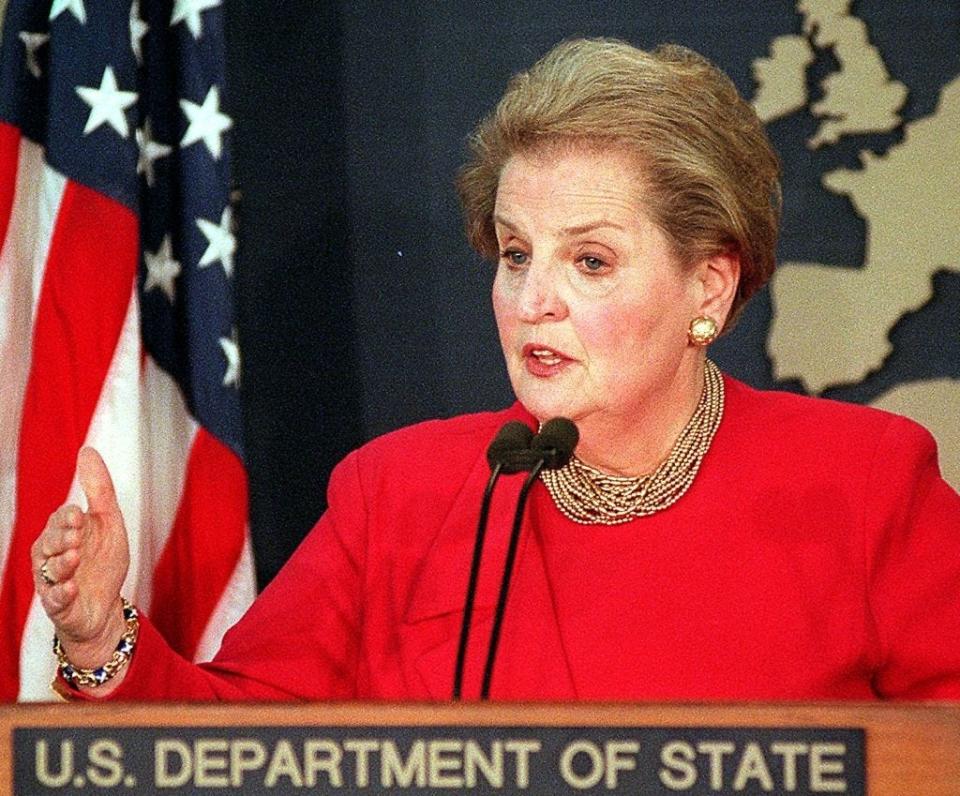

You've written a book about fascism ("Fascism: A Warning," 2018). Are you concerned we're heading down that path? Is that too strong of a word?
I wrote it before the virus obviously. There were divisions already in our society. Every country has divisions. But a demagogic leader is somebody that can exacerbate those divisions.
The first person to be a fascist was (dictator Benito) Mussolini. Italy had been on the side of the Allies during World War I, but people felt they were not respected enough for the role they played. They had economic problems.
Are you registered to vote? Take the first step to making sure your vote counts.
Mussolini was an outsider, a good speaker, somebody that could motivate people. He kind of got into the middle of this situation and began to exacerbate it by aligning himself with one group of people at the expense of another.
The best quote in that book was from Mussolini, in which he said, "If you pluck a chicken one feather at a time, nobody notices." I was thinking there was a lot of feather plucking going on and I could see some of it going on in Europe at the time with Hungary (Prime Minister) Viktor Orbán, or in Poland. Then in the Philippines with (President Rodrigo) Duterte or in Venezuela and Brazil. Various places that were making me nervous in terms of the steps that they were taking.
By the way, fascism is not an ideology. It is a process for gaining power and it begins with a demagogic leader who is able to exacerbate the differences that are kind of normal in any society, who thinks that he's above the law, who thinks the press is the enemy of the people and is somebody who is willing to do pretty much anything to be in power.
That book was a couple of years ago. Would you give a stronger warning now? Are we on the road to being there?
Well, we're not there. But there has been a lot of feather plucking going on. I don't want us to wake up when actually that bird is bald. We have to call it out.

How do you define courage?
I think it's when you stand up for what you believe in when it's not always easy and you get criticized for it. It took me a long time to find my voice. But having found it, I'm not going to shut up. I'm going to use it to the best of my ability in terms of making sure that democracy is our form of government and that those around the world that want to live in a democracy have a possibility to do so.
Nicole Carroll is editor in chief of USA TODAY. This interview has been edited for length and clarity.
SUBSCRIBE: Help support quality journalism like this.
More coverage
Women of the Century: They didn’t succeed despite adversity, but often because of it
50 states: Learn about notable women from every state
Who is your Woman of the Century?: Let us know
Recognizing women past and present: See all of our coverage
Women of the Century Q&As
Rita Moreno: On bravery, her journey and the importance of listening
Dr. Mona Hanna-Attisha: Lead was poisoning water in Flint, Michigan. She put her reputation on the line to prove it
Ruby Bridges: She was 6 when she walked into a segregated school. Now she teaches children to get past racial differences.
Billie Jean King: On her journey for equal rights in tennis, life: ‘No one ever has it easy’
Jessie ‘Little Doe’ Baird: The language had gone quiet. Remarkably, she brought it back, saving far more than just words
Tarana Burke: On the power of empathy, the building block of the Me Too movement
Cristina Jiménez Moreta: She helped get DACA, now she helps young immigrants find their voice
Dolores Huerta: At 90, the labor leader still works to make a difference
Gloria Estefan: ‘Be in each and every moment, that’s the only thing you really have that’s guaranteed’
Dolly Parton: ‘The whole magic about me is that I look artificial, but I’m totally real’
This article originally appeared on USA TODAY: Madeleine Albright, in her words: Secretary of state talks courage

